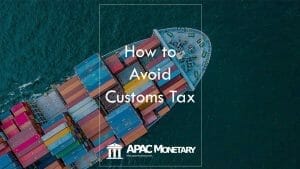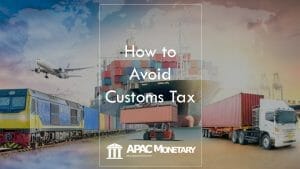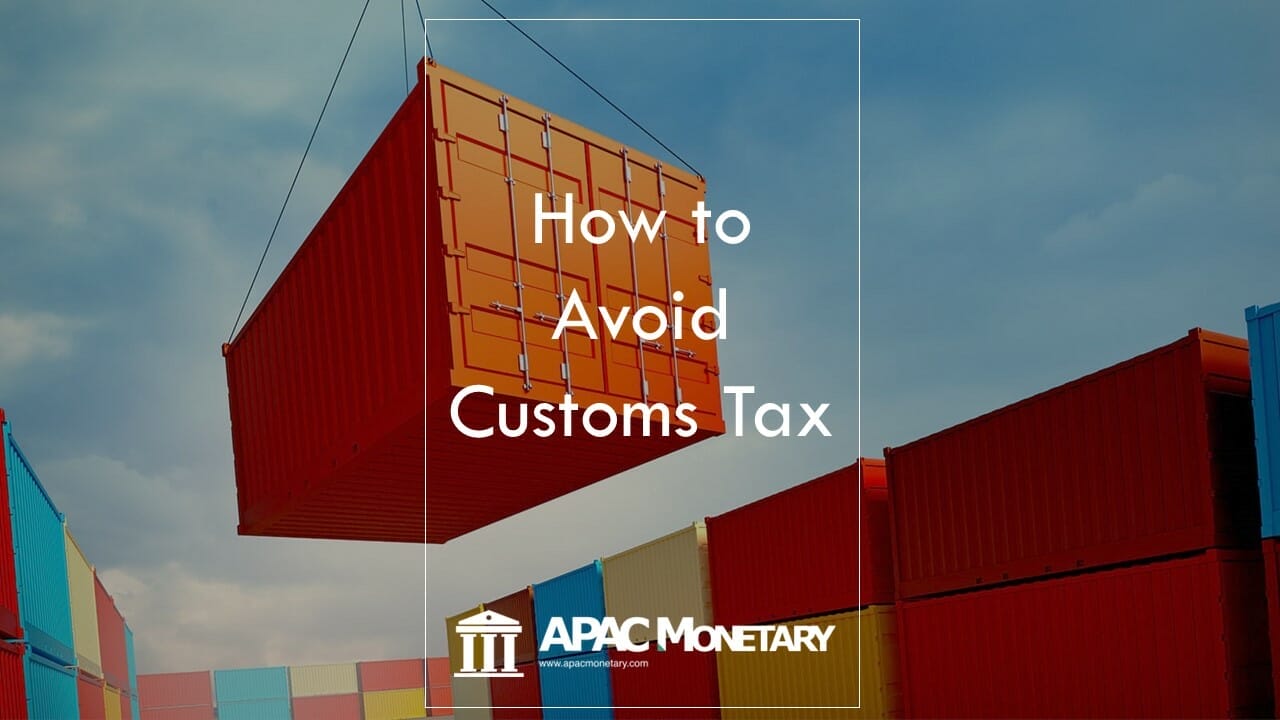Table of Contents
When traveling to the Philippines, it is important to be aware of the customs tax in order to avoid it. The tax is based on the value of the goods that are being brought into the country. There are a few ways to avoid paying the tax, such as by declaring the value of the goods at less than PHP 10,000, or by bringing in goods that are for personal use only. Here are ways how to avoid customs tax in the Philippines legally.
Established in 1902, the Bureau of Customs (BOC) is under the Department of Finance. Apart from collecting duties and taxes, they also facilitate the movement of goods in international trade, prevent the entry of illegal goods, supervise and control the entrance of vessels and aircraft involved in foreign commerce, and others.
In the Philippines, all goods entering the country are subject to payment of duties, taxes, and other local charges, according to the Philippines customs law. The Bureau of Customs (BOC) is the government agency in charge of collecting those fees.
When you purchase goods from another country and have them shipped to the Philippines, you become an importer. This means you are required to complete your duty and tax payment. Paying the correct amount of duty and tax is a social responsibility of a Filipino company, individual, or foreign traveler to the country. And those duties and taxes we pay from importing goods are meant for essential things.
In particular, the purpose of duties is to protect our country’s economy, local jobs, residents, environment, and so on. The taxes will go to the government funds that will be used in establishing and improving the government facilities, as well as in making the life of our countrymen, inside and outside our nation, better.
If you’re wondering how to avoid customs tax Philippines, well, there’s this one legal way. You have to make sure that the value of the goods you purchase from outside the country doesn’t exceed 10,000 pesos.
Back in 2016, the Bureau of Customs increased the “de minimis” value from 10 to 10,000 pesos as its first action under the Customs Modernization and Tariff Act (CMTA). The “de minimis” refers to the value of goods for which no duty or tax is accumulated. Goods that are worth 10,000 pesos or below are entitled to immediate release.
However, keep in mind that not all products are covered under the new de minimis rule, such as restricted and prohibited importations. For example, the entry of wines and tobacco goods within the de minimis value is still subject to paying the excise tax.
How to Avoid Customs Tax in the Philippines
So the answer to the question “how to avoid customs tax in the Philippines” is the de minimis rule.
In addition to this, there are conditions/limitations that are inclined to the duty and tax-free privilege.
Here are ways how to avoid customs tax in the Philippines legally. See the list below:
- Presentation of a favorable written endorsement to the Bureau of Customs
- The goods granted duty- and tax-free privilege shall not be sold, bartered, or traded.
- The quantity is not commercial.
- The goods are not prohibited importations.
- If the materials are regulated importations, endorsements from the appropriate regulatory agency.

General Guidelines for Travelers on How to Avoid Customs Tax in the Philippines
One of the most important things to know when traveling to the Philippines is how to avoid paying customs tax. There are a few things that you can do to avoid paying customs tax in the Philippines.
First, make sure that you have all of your documents in order. If you are missing any documentation, you will be required to pay a customs tax.
Second, try to pack light. The less luggage you have, the less likely you are to be taxed. third, ship your items ahead of time. If you ship your items ahead of time, they will arrive before you, and you will not have to pay customs tax on them.
Following these tips will help you avoid paying customs tax in the Philippines. Be sure to plan ahead and pack light to make your trip as stress-free as possible!
Tips on What To Do If You Are Selected For A Customs Audit
If you are unfortunate enough to be selected for a customs audit in the Philippines, there are some steps you can take to minimize the amount of taxes you owe. First, be cooperative with the customs officials and provide all the documentation they request. Next, try to negotiate a payment plan if you cannot pay the full amount owed. Finally, appeal the decision if you believe the assessment is unfair. By following these tips, you can minimize the financial impact of a customs audit.
How to Avoid Customs Tax in the Philippines if You’re Importing Goods
When importing goods into the Philippines from other countries, there are a few ways to avoid paying customs tax.
First, you can take advantage of the Philippine government’s Corporate Recovery and Tax Incentives for Enterprises (CREATE) Act (RA 11534). However, this may only apply to companies that are duly registered in the Special Economic Zone Act of 1995 (RA 7916), which exempts certain export-oriented businesses from paying taxes.
Second, you can apply for a customs tariff reduction or suspension. This is available for imported goods that are not produced in the Philippines and are used in manufacturing processes that result in products that are exported.
Third, you can import goods that are temporarily admitted into the country under a Customs Bonded Warehouse program. This allows you to store goods in a bonded warehouse without paying duties and taxes until they are ready to be shipped out of the country.
BOC Tax in the Philippines Sample Calculation
Here’s a sample of the Bureau of Customs’ tax sample calculation in the Philippines
| Duty and Sales Tax in the Philippines | |||
| Duty Rates | Average Duty Rate | Sales Tax (GST) or VAT | Threshold on goods |
| 0% to 65% | 10.50% | ST=12% | No duty if the CIF value won’t exceed US$15 |
| VAT = ST * (CIF + Duty) | |||
If the CIF value of the imported goods is $1,000.00, The import tax is 5%, and the sales tax is 12%.
Therefore, the tax calculation is:
- Import Duty = 5% x $1,000 = $50.00
- VAT = 12% * ($1,000.00 + $50) = $126.00
- Total Import Tax = $50.00 + $126.00 = $176.00
What is the Bureau of Customs?
The Bureau of Customs is a government agency responsible for collecting taxes on imported goods. Goods that are subject to customs tax include alcohol, tobacco, and petroleum products. The tax rate is based on the value of the goods being imported.
Customs taxes are generally considered to be indirect taxes, as they are not levied on specific individuals but rather on the importation of goods into the country. This means that everyone who imports goods into the Philippines is required to pay customs tax.

Why is the Bureau of Customs Collecting Taxes?
The Bureau of Customs is responsible for collecting taxes on imported goods. Taxes on imported goods are used to finance the government’s operations and to protect local industries. The tax rate depends on the type of product imported and the country of origin.
Some people try to avoid paying customs tax by declaring their products as gifts or by undervaluing them. However, this is illegal and can result in penalties. If you are caught avoiding customs tax, you may be required to pay a fine, and your goods may be seized.
Things to remember before paying customs duty taxes
When shipping goods into the Philippines, it is important to be aware of the customs taxes and duties that may be applied. These taxes can vary depending on the type and value of the goods being imported, so it is important to do some research before making any shipments.
One way to avoid paying customs tax is to ship your goods through a registered agent or broker. These professionals can help you navigate the customs process and ensure that your shipment is properly classified. They can also help you apply for any exemptions or duty-free status that may apply to your shipment.
Another way to reduce your customs tax liability is to source your goods from a country that has a preferential trade agreement with the Philippines. Under these agreements, certain goods are subject to reduced or eliminated tariffs when imported from certain countries.
Should You Use a Brokerage Company to Avoid Customs Tax in the Philippines?
When it comes to importing goods into the Philippines, one of the main concerns is customs duty tax. This tax can add a significant amount to the cost of your shipment, so you may be wondering if there’s a way to avoid it.
One option is to use a brokerage company. A brokerage company can help you clear your shipment through customs, and they may be able to get you a lower duty rate. They can also help you with the paperwork and other requirements that come with importing goods.
Using a brokerage company is not the only way to avoid paying customs duty tax. You can also try to ship your goods via “in-bond” or “free trade zones”. These are areas where shipments are not subject to duty taxes.

Conclusion: How to Avoid Customs Tax in the Philippines
In conclusion, there are a few simple things you can do how to avoid customs tax in the Philippines. Make sure you check the dutiable value of your item before bringing it into the country. If possible, have your item sent to you via express mail or courier service so that it arrives directly at your door. Lastly, be prepared to pay any taxes due when you arrive at customs. By following these tips, you can avoid paying unnecessary customs tax in the Philippines.







